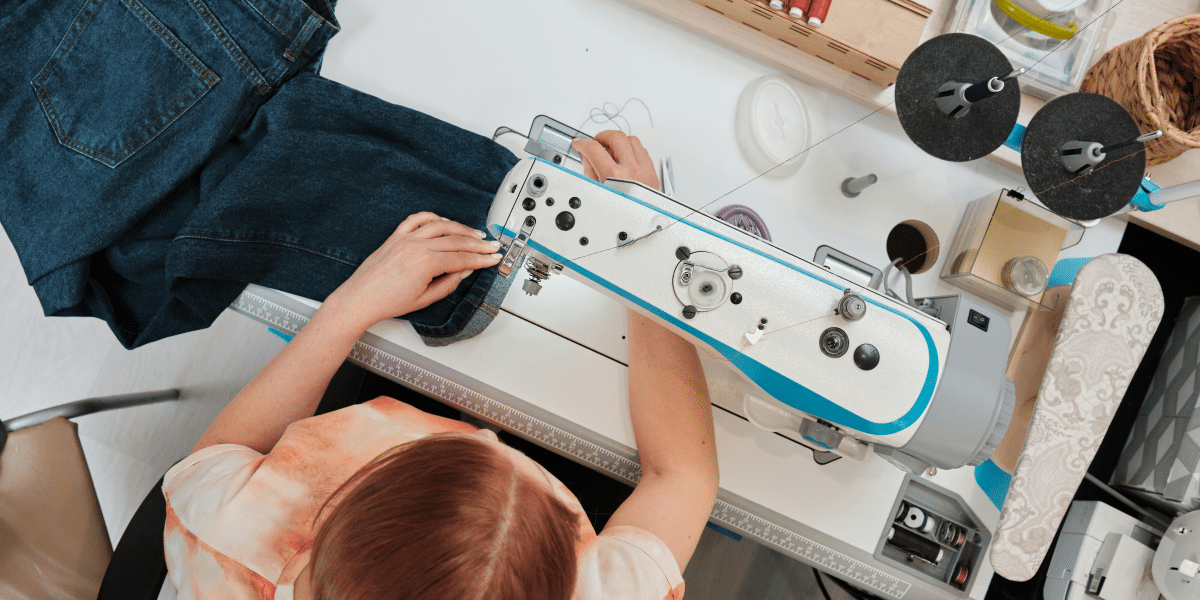By: Corey Pearson, VP of Customer Success at Linda’s Electric Quilters
There is a growing movement towards more sustainable fashion practices. One practice gaining traction is reworking old quilts from thrift stores into new, stylish clothing items. This trend, fueled by TikTok, is a creative way to embrace slow fashion and a means to support small businesses and artisans while offering a more ethical alternative to big-box retailers.
The TikTok Influence
TikTok, the social media platform known for its viral trends, has played a significant role in popularizing the concept of reworking old quilts into fashionable clothing. Videos showcasing thrift store hauls, DIY tutorials, and stunning transformations of vintage quilts into coats, jackets, and other garments have garnered millions of views. This trend resonates with a younger audience eager to express individuality while making environmentally conscious choices.
Slow Fashion and Sustainability
Quilting and sewing align perfectly with slow fashion principles, a movement that advocates for mindful consumption and quality over quantity. Slow fashion emphasizes the upscaling of garments, the use of sustainable materials, and ethical production practices. By reworking old quilts, individuals can create one-of-a-kind pieces that reflect their style while minimizing their environmental footprint.
According to the Environmental Protection Agency (EPA), textile waste occupies nearly 5% of all landfill space, with Americans discarding around 12.8 million tons of textiles annually. By repurposing old quilts, fashion enthusiasts can help reduce this waste and promote a more sustainable approach to clothing.
Quilting is a time-honored craft that embodies slow fashion principles by using fabric scraps and old textiles. Quilted garments are known for their durability and longevity, ensuring they can withstand the test of time. Each quilted piece is unique, reflecting the creativity and craftsmanship of its maker, which contrasts sharply with the mass-produced uniformity of fast fashion. This individuality and the mindful approach to consumption fosters a deeper connection to the clothing people wear, making them more likely to cherish and care for these items.
The resurgence of interest in quilting, spurred by trends on platforms like TikTok, represents a movement towards a more sustainable and ethical approach to clothing. By reworking old quilts into new garments, fashion enthusiasts are actively participating in the slow fashion movement, reducing textile waste, promoting sustainable materials, and supporting ethical production practices. This shift benefits the environment and creates a greater appreciation for the art of quilting and the value of handmade, one-of-a-kind items.
Supporting Small Businesses and Artisans
The rise of quilted fashion has also provided opportunities for small businesses and independent artisans to thrive. Many creators sell their handmade quilted garments through platforms like Etsy and Instagram, offering shoppers a unique alternative to mass-produced items found in big-box stores. These small businesses often prioritize ethical practices, using sustainable materials and fair labor practices.
Ethical Alternatives to Fast Fashion
Big-box stores have long been criticized for their questionable ethical practices, both from a humanitarian and environmental standpoint. The fashion industry is notorious for poor working conditions, low wages, and environmentally damaging production processes. In contrast, buying from small businesses and independent artisans offers a more ethical alternative.
Consumers can consciously choose to support better labor practices by opting for handmade, quilted garments. Additionally, the fashion industry is a significant contributor to environmental degradation. According to the World Bank, it accounts for 10% of global carbon emissions and nearly 20% of wastewater. Embracing sustainable practices like quilting can help mitigate these impacts by reducing the need for new fabric production and encouraging the reuse of existing materials.
A Fashionable Future
The trend of reworking old quilts into new garments represents a positive shift towards sustainable fashion practices. TikTok has been pivotal in popularizing this movement, inspiring a new generation to embrace slow fashion and make more ethical choices. By supporting small businesses and artisans, consumers can enjoy unique, high-quality products while contributing to a more sustainable and humane fashion industry.
As the demand for sustainable fashion continues to grow, the art of quilting and sewing offers a creative and meaningful way to make a difference. By giving old quilts a new life, individuals can celebrate individuality, support ethical practices, and promote a more sustainable future for fashion.
Published by: Nelly Chavez


















